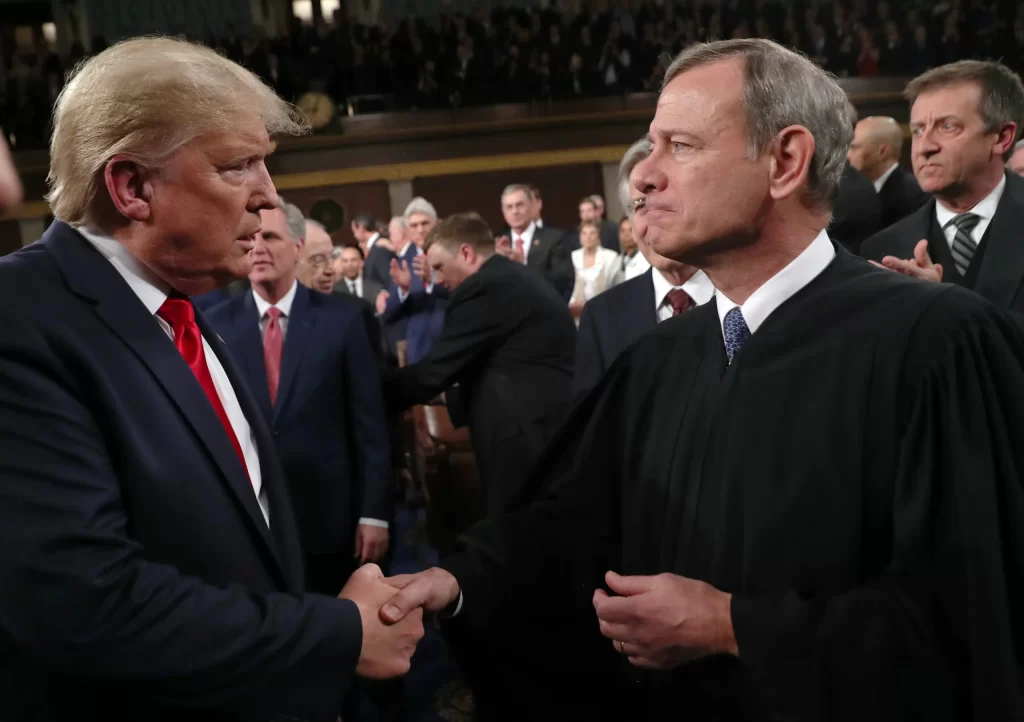As Trump grasps unprecedented power, the Supreme Court’s decision on presidential immunity looms large
4 min read
Image may contain John Roberts Kevin McCarthy People Person Accessories Formal Wear Tie Adult and Crowd President Donald Trump shakes hands with Supreme Court Chief Justice John Roberts before the State of the Union address in the House chamber on February 4, 2020 in Washington, DC.Leah Millis-Pool/Getty Images
As Donald Trump eyes a potential return to the White House in January, a critical Supreme Court ruling on presidential immunity has raised significant concerns about the limits of executive power. The 6-3 decision, issued in July, granted Trump broad immunity for actions taken within his constitutional role as president. This ruling could provide him with unprecedented latitude in his second term, potentially undermining the checks and balances that have traditionally constrained presidential authority.
The decision has reignited fears, especially among Trump’s critics, that an empowered president could operate without accountability, particularly when it comes to legal and ethical boundaries. With Trump poised for a second term and having already vowed to fire special counsel Jack Smith and pursue actions against his political opponents, the stakes are high.
For more than 250 years, the possibility of criminal prosecution served as a critical guardrail against presidential abuse of power. But that safeguard has now been eroded, and according to legal experts, there are few remaining checks to hold Trump accountable for potential overreach. “That guardrail is now gone,” said Neil Eggleston, a former White House counsel during the Obama administration. “I see few if any others that will constrain President Trump.”
The Supreme Court’s ruling granted Trump “absolute” immunity for actions within his constitutional duties, such as directing the Justice Department’s investigative activities, while offering a more limited immunity for other actions. Chief Justice John Roberts, writing for the majority, argued that Congress could not criminalize actions that a president takes in executing the responsibilities of the executive branch. However, while the ruling aimed to protect presidents from politically motivated prosecutions, it also removed an important constraint on a president’s ability to act unchecked.
Justice Sonia Sotomayor, in her dissent, warned that the decision could create a scenario where future presidents are “a king above the law.” She outlined extreme hypothetical scenarios, such as ordering military actions against political rivals or taking bribes, arguing that under this ruling, such actions could be deemed immune from prosecution.
The scope of this immunity, however, remains unclear. The ruling left many questions unanswered, particularly around what constitutes “official actions” that qualify for immunity and what the court means by a president’s “core” constitutional functions. The vagueness leaves room for legal uncertainty as Trump prepares to take office again. Lower courts will likely be tasked with defining the boundaries of this immunity, but it is uncertain when they will address these issues, if at all.
One of the most significant outcomes of the decision was its impact on Trump’s interactions with the Justice Department. In the case of the 2020 election subversion, Trump allegedly pressured officials to pursue fraudulent investigations into election fraud. Despite these allegations, the Supreme Court’s ruling determined that the president’s direction of such investigations falls within his constitutional powers, thus granting him immunity from prosecution in these instances.
The ruling also raises alarms about the level of control Trump would have over other branches of government, including intelligence services and the military. Though the ruling did not explicitly address these areas, many legal experts believe the same principles of immunity could apply. “At least for the short term, the problem is the Justice Department,” said Richard Painter, a former ethics lawyer for President George W. Bush. “The president has near-complete control.”
This legal backdrop has fueled concerns about Trump’s potential to weaponize the powers of his office. During his campaign, Trump made clear his intent to target political adversaries, including President Joe Biden and Vice President Kamala Harris, whom he has called for prosecution. These aggressive statements, while brushed off by his supporters as campaign rhetoric, signal a potential disregard for ethical and legal constraints in a second term.
Nonetheless, some checks on Trump’s power remain, notably in the form of institutional safeguards. While the Supreme Court granted immunity to the president, aides, officials, and others within the executive branch are not afforded the same protection. This could provide a potential line of defense against any efforts by the president to push legal boundaries. Trump’s first term was marked by resistance from some of his staff, and this time, he has emphasized the importance of loyalty, signaling that he will surround himself with allies who will support his agenda without question.
As Trump continues to shape his second-term cabinet, questions about the reach of presidential immunity will undoubtedly persist. However, with his broad control over the Justice Department and other key institutions, Trump is poised to enter office with significantly more power than he had in his first term. Whether this newfound immunity will ultimately enable or constrain his actions remains to be seen, but it is clear that the balance of power has shifted in a way that could have lasting consequences for American democracy.







